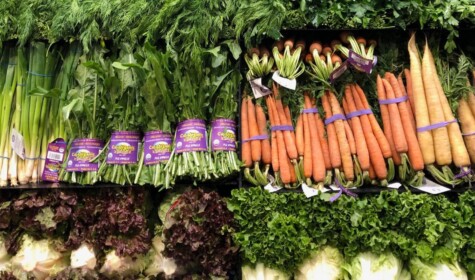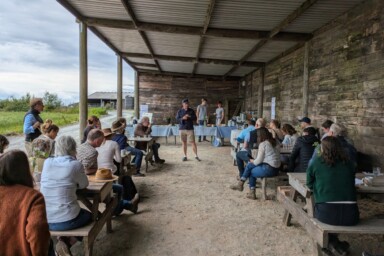It seems hard to comprehend, living as we do in the twenty first century, that food security would ever be something we would need to concern ourselves with. But it’s a thing now. It’s a sign of the times when a cargo ship full of grain sailing across the Black Sea becomes a major international news story. And you’d better believe that this is just the tip of the iceberg; the impact of war, as terrible as that is, is nothing compared to the effect that climate change is going to have in terms of our food security.
One thing that we really must be doing, both in terms of preventing the worst-case scenario of climate change and also helping us cope with the inevitable food security troubles we will face in the future, is to create resilient local food economies. And for qualification of that statement, should it be required, simply cast your mind back to the lockdown in March 2020 and remember how local food enterprises up and down the country not only continued to supply their customers, but quickly scaled up to meet the surge in demand, while supermarket shelves were bare for weeks.
Such local food economies would be characterised by an abundance of independent food enterprises: farmers and market gardeners who grow food specially for the local market, artisanal processing businesses who lovingly add value to locally grown food, and independent shops and restaurants which sell local food. And more to the point, when a local food system has taken root, it is possible to coordinate the supply-chain between these local enterprises according to ‘circular economy’ principles, and dramatically reduce the environmental impact of food in comparison to the industrialised system currently in place.
These days, I have the privilege of meeting small-scale food producers and other food enterprises from all over the UK, as I travel from place to place doing my workshops on ‘Pathway to Local Food Ecosystems’. These incredible people, who I have the utmost respect for, invariably tell me the same thing…they are finding it hard. They are finding it really hard, especially financially. Many of them exist on a knife-edge, where the smallest of things could be the straw that breaks the camel’s back.
This staggers me.
Not that they are finding life tough, that’s very easy to relate to. The thing that staggers me is just how undervalued these people are by society. These are the people who produce our food, for goodness’ sake! And they do it sustainably. These will be the people who are feeding us if (or should that be when?) the next global catastrophe strikes. If we don’t get our act together soon and change things so that someone can earn a decent living running a food enterprise at a local level, then we risk losing something very precious indeed.
How can we support local food economies?
Well, we can encourage people to buy and eat locally grown food, of course. But then, we’ve been putting that message out there for decades and most people that are inclined to support local growers through their buying habits are already doing so.
To my mind, we shouldn’t be thinking in terms of ‘protecting’ our grassroots, sustainable food industry. No, we should be thinking in terms of making it thrive, giving it the opportunity and resources to scale to the point where it is no longer ‘niche’, and rather, representing a significant portion of the total amount of food eaten in this country. Achieving this is not at all impossible, but it’s going to take a lot more than a publicity campaign. This is where local authorities and government can step in, by implementing policy and providing resources to put infrastructure in place that would support local food production and trade. This could take the form of ‘food hubs’: local food storage and distribution centres whose purpose is to manage local food supply-chains in ways that enable producers, processors, retailers, caterers and food related social projects to work in unity with one another as part of a sustainable food system.
The solution to our food security problems does not end with the provision of this infrastructure. If we really want to do something transformative with our food system, we’ve got to be bold and start re-thinking the economic models that underpin it. The economic model currently driving our food system is based on exploitative, linear systems which are destructive, wasteful and geared to meet the needs of shareholders above the needs of people and planet. This economic model is the only thing we’ve really known, which makes it very difficult to look beyond, or indeed, to change. But, that doesn’t mean there aren’t other ways of doing things. In this respect, we can certainly look to ‘Principles of Harmony’ for inspiration, as described by His Majesty the King in his book Harmony: A New Way of Looking at Our World. And we’ve also got to be brave enough to put them into practise.







